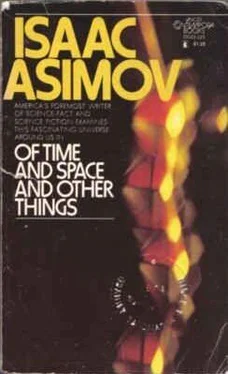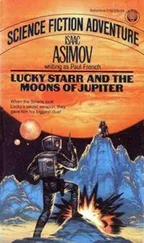Isaac Asimov - Of Time and Space and Other Things
Здесь есть возможность читать онлайн «Isaac Asimov - Of Time and Space and Other Things» весь текст электронной книги совершенно бесплатно (целиком полную версию без сокращений). В некоторых случаях можно слушать аудио, скачать через торрент в формате fb2 и присутствует краткое содержание. Год выпуска: 1972, ISBN: 1972, Издательство: Lancer Books, Жанр: Прочая научная литература, на английском языке. Описание произведения, (предисловие) а так же отзывы посетителей доступны на портале библиотеки ЛибКат.
- Название:Of Time and Space and Other Things
- Автор:
- Издательство:Lancer Books
- Жанр:
- Год:1972
- ISBN:ISBN: 0-447-33023-3
- Рейтинг книги:4 / 5. Голосов: 1
-
Избранное:Добавить в избранное
- Отзывы:
-
Ваша оценка:
- 80
- 1
- 2
- 3
- 4
- 5
Of Time and Space and Other Things: краткое содержание, описание и аннотация
Предлагаем к чтению аннотацию, описание, краткое содержание или предисловие (зависит от того, что написал сам автор книги «Of Time and Space and Other Things»). Если вы не нашли необходимую информацию о книге — напишите в комментариях, мы постараемся отыскать её.
Of Time and Space and Other Things — читать онлайн бесплатно полную книгу (весь текст) целиком
Ниже представлен текст книги, разбитый по страницам. Система сохранения места последней прочитанной страницы, позволяет с удобством читать онлайн бесплатно книгу «Of Time and Space and Other Things», без необходимости каждый раз заново искать на чём Вы остановились. Поставьте закладку, и сможете в любой момент перейти на страницу, на которой закончили чтение.
Интервал:
Закладка:
And in Luke 2:2, the time of the taxing, during which Jesus was born, is dated only as follows: "And this taxing was first made when Cyrenius was governor of Syria."
Unless you have accurate lists of kings and magistrates and know just how many years each was in power and how to relate the list of one region with that of another, you are in trouble, and it is for that reason that so many ancient dates are uncertain even (as I shall soon explain) a date as important as that of the birth of Jesus.
A much better system would be to pick some important date in the past (preferably one far enough in the past so that you don't have to deal with negative-numbered years before that time) and number the years in progres sion thereafter, without ever starting over.
The Greeks made use of the Olympian Games for that purpose. This was celebrated every four years so that a four-year cycle was an "Olympiad." The Olympiads were numbered progressively, and the year itself was the Ist, 2nd, 3rd or 4th year of a particular Olympiad.
This is needlessly complicated, however, and in the time following Alexander the Great something better was in troduced into the Greek world. The ancient East was being fought over by Alexander's generals, and one of them, Seleucus, defeated another at Gaza. By this victory Seleu cus was confirmed in his rule over a vast section of Asia.
He determined to number the years from that battle, which took place in the Ist year of the 117th Olympiad. That year became Year 1 of the "Seleucid Era," and later years continued in succession as 2, 3, 4, 5, and so on. Nothing more elaborate than that.
The Seleucid Era was of unusual importance because Se leucus and his descendants ruled over Judea, which there fore adopted the system. Even after the Jews broke free o If the Seleucids under the leadership of the Maccabees, they continued to use the Seleucid Era in dating their com mercial transactions over the length and breadth of the ancient world. Those commercial records can be tied in with various local year-dating systems, so that many of them could be accurately synchronized as a result.
The most important year-dating system of the ancient world, however, was that of the "Roman Era." This began with the year in which Rome was founded. According to tradition, this was the 4th Year of the 6th Olympiad, which came to be considered as I A.U.C. (The abbrevia tion "A.U.C." stands for "Anno Urbis Conditae"; that is, "The Year of the Founding of the City.")
Using the Roman Era, the Battle of Zama, in which Hannibal was defeated, was fought in 553 A.U.C., while Julius Caesar was assassinated in 710 A.U.C., and so on. This system gradually spread over the ancient world, as Rome waxed supreme, and lasted well into early medieval times.
The early Christians, anxious to show that biblical records antedated those of Greece and Rome, strove to begin counting at a date earlier than that of either the founding of Rome or the beginning of the Olympian Games. A Church historian, Eusebius of Caesarea, who lived about 1050 A.U.C., calculated that the Patriarch, Abraham, bad been born 1263 years before the founding of Rome. Therefore he adopted that year as his Year 1, so that 1050 A.u.c. became 2313, Era of Abraham.
Once the Bible was thoroughly established as the book of the western world, it was possible to carry matters to their logical extreme and date the years from the creation of the world. The medieval Jews calculated that the crea tion of the world had taken place 3007 years before the founding of Rome, while various Christian calculators chose years varying from 3251 to 4755 years before the founding of Rome. These are the various "Mundane Eras" ("Eras of the World"). The Jewish Mundane Era is used today in the Jewish calendar, so that in September 1964, the Jewish year 5725 began.
The Mundane Eras have one important factor in their favor. They start early enough so that there are very few, if any, dates in recorded history that have to be given negative numbers. This is, not true of the Roman Era, for instance. The founding of the Olympian Games, the Trojan War, the reign of David, the building of the Pyramids, all came before the foundin of Rome and have to be given negative year numbers.
The Romans wouldn't have cared, of course, for none of the ancients were very chronology conscious, but modem historians would. In fact, modem historians are even worse off than they would have been if the Roman Era had been retained.
About 1288 A.U.c., a Syrian monk named Dionysius Exiguus, working from biblical data and secular records, calculated that Jesus must have been born in 754 A.U.C.
This seemed a good time to use as a beginning for counting the years, and in the time of Charlemagne (two and a half centuries after Dionysius) this notion won out.
The year 754 A.U.c. became A.1). I (standing for Anno Domini, meaning "the year of the Lord"). By this new "Christian Era," the founding of Rome took place in 753 B.C. ("before Christ"). The first year of the first Olvmt)iad was in 776 B.C., the first year of the Seleucid Era was in 312 Bc., and so on.
This is the system used today, and means that all or ancient history from Sumer to Augustus must be dated in negative numbers, and we must forever remember that Caesar was assassinated in 44 B.C. and that the next year is number 43 and not 45.
Worse still, Dionysius was wrong in his calculations.
Matthew 2: 1 clearly states that "Jesus was born in Bethle hem of Judea in the days of Herod the king." This Herod is the so-called Herod the Great, who was born about 681 A.u.c., and was made king of Judea by Mark Antony in 714 A.u.c. He died (and this is known as certainly as any ancient date is known) in 750 A.U.c., and therefore Jesus could not have been born any later than 750 A.U.C.
But 750 A.U.c., according to the system of Dio'nysius Exiguus, is 4 B.C., and therefore you constantly find in lists of dates that Jesus was born in 4 B.C.; that is, four years before the birth of Jesus.
In fact, there is no reason to be sure that Jesus was born in the very year that Herod died. In Matthew 2:16, it is written that Herod, in an attempt to kill Jesus, ordered all male children of two years and under to be slain. This verse can be interpreted as indicating that Jesus may have been at least two years old while Herod was still alive, and might therefore have been born as early as 6 B.C. Indeed, some estimates have placed the birth of Jesus as early as 17 B.C.
Which forces me to admit sadly that although I lo begin at the beginning, I can't always be sure where beginning is.
3. Ghost Lines In The Sky
My son is bearing, with strained patience, the quasi-hu morous changes being rung upon his last name by his grade,school classmates. My explanation to him that the name "Asimov," properly pronounced, has a noble reso nance like the distant clash of sword on shield in the age of chivalry, leaves him unmoved. The hostile look in his eyes tells me quite plainly that he considers it my duty as a father to change my name to "Smith" forthwith.
Of course, I sympathize with him, for in my time, 1, too, have been victimized in this fashion. The ordinary misspellings of the uninformed I lay to one side. However, there was one time…
It was when I was in the Army and working out my stint in basic training. One of the courses to which we were exposed was map-reading, which had the great advantage of being better than drilling and hiking. And then, like a bolt of lightning, the sergeant in charge pronounced the fatal word "azimuth" and all faces turned toward me.
I stared back at those stalwart soldier-boys in horror, for I realized that behind every pair of beady little eyes, a small brain had suddenly discovered a source of infinite fun.
You're right. For what seemed months, I was Isaac Azimuth to every comic on the post, and every soldier on the post considered himself a comic. But, as I told myself (paraphrasing a great American poet), "This is the army, Mr. Azimuth."
Читать дальшеИнтервал:
Закладка:
Похожие книги на «Of Time and Space and Other Things»
Представляем Вашему вниманию похожие книги на «Of Time and Space and Other Things» списком для выбора. Мы отобрали схожую по названию и смыслу литературу в надежде предоставить читателям больше вариантов отыскать новые, интересные, ещё непрочитанные произведения.
Обсуждение, отзывы о книге «Of Time and Space and Other Things» и просто собственные мнения читателей. Оставьте ваши комментарии, напишите, что Вы думаете о произведении, его смысле или главных героях. Укажите что конкретно понравилось, а что нет, и почему Вы так считаете.












